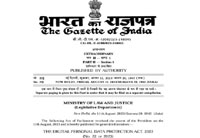
Watchdogs demanded review of law in consultation with media stakeholders
IFJ Readout
NATIONAL, November 28, 2025: India’s controversial Digital Personal Data Protection (DPDP) Act, 2023 came into effect on November 14 amid backlash from critics who say the law will increase government surveillance, restrict freedom of information, and weaken press freedom. The International Federation of Journalists (IFJ) joins its affiliate, the Indian Journalists Union (IJU), in seeking a thorough review of the law in consultation with media stakeholders.
The implementation of the DPDP Act by India’s Ministry of Electronics and Information Technology follows its passage through the Indian Parliament on August 9, 2023. The Act has drawn strong criticism from press freedom groups and academics, who argue it grants “arbitrary and undisputed powers” to the Indian government and weakens key privacy safeguards.
Its broad, vaguely defined exemptions allow state agencies access to personal data with minimal independent oversight, while offering individuals no clear right to prevent their data from being retained in databases. The law also amends a key provision of the Right to Information Act that previously enabled journalists to obtain and disclose information in the public interest, creating new legal hurdles for transparency and public-interest reporting.
The Act seeks to protect the online data of Indian citizens by requiring tech platforms and government services to securely protect personal data and obtain consent. It prescribes penalties of up to INR 2.5 billion (approx. USD 28 million) for failing to implement reasonable security safeguards.
The Act also establishes the Data Protection Board of India, which can investigate breaches, enforce compliance, and issue penalties. Online platforms have been granted an 18-month window to comply with the new law.
The IJU warned that the Act could enable the government to expand censorship and impose arbitrary checks on journalists and media outlets, while the Press Club of India said that its ambiguity could be weaponised to intimidate reporters. In July, the Editors Guild of India argued the new law would create compliance burdens, hinder accountability journalism and restrict access to information.
The IFJ said, “The DPDP Act poses a dire threat to critical and independent media by increasing surveillance and restrictions on digital expression in the world’s largest democracy. The Indian legislature must immediately review the law to ensure that press freedom and the right to information are upheld.”
https://indigenousherald.com/